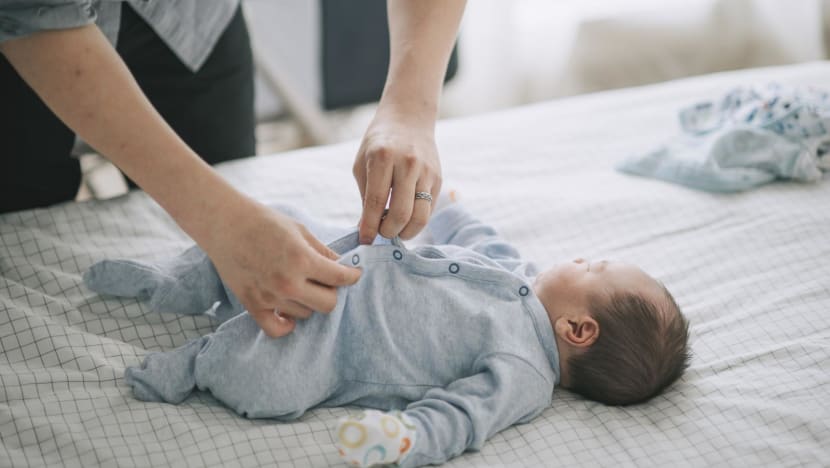New fathers at StanChart to get 20 weeks of paid parental leave; HSBC to increase paternity and maternity leave

A baby boy on a bed. (Photo: iStock)
SINGAPORE: Two banks in Singapore are stepping up for new fathers, giving them more paid time off to care for their newborns.
Starting Friday (Sep 1), employees at Standard Chartered Bank will get 20 weeks of paid parental leave "irrespective of gender", the bank said on Wednesday.
The move to standardise the amount of leave offered will provide "all parents with the opportunity for greater equality in caregiving responsibilities for their children", it added.
Female employees at StanChart have been eligible for 20 weeks of paid maternity and adoption leave since 2017.
Male employees, on the other hand, are currently eligible for two weeks of government-paid paternity leave and four weeks of shared parental leave.
HSBC also announced on Wednesday extended paternity and maternity leave for its employees. Starting Friday, paternity leave will increase to eight weeks, up from the current two weeks, while maternity leave will increase to 26 weeks, up from 16 weeks.
“With the ever-changing needs of our workforce, we must continue to review and enhance our policies to ensure that we are building an inclusive workplace where our employees can thrive at home and at work,” said HSBC Singapore’s head of human resources Mukul Anand.
Meanwhile, Standard Chartered’s group head of human resources Tanuj Kapilashrami said the changes will help address globally prevalent societal norms around traditional roles, improve workforce participation and provide options to those who want to take up shared childcare responsibilities.
“This will positively impact families’ financial well-being and create a more inclusive workplace that supports each individual’s unique family planning choices. We hope that our actions inspire other employers - across industries, around the world - to take similar actions,” she added.
Other banks like OCBC and DBS also have schemes in place to support new parents.
OCBC currently offers 16 weeks of paid maternity leave, two weeks of paid paternity leave and 12 weeks of paid adoption leave for employees in Singapore, the bank said in response to CNA's query about its parental leave policies.
According to Ernest Phang, OCBC's managing director for group human resources, the bank also has support programmes in place, including one that helps new parents integrate back to work after their parental leave.
"All parents of newborns and caregivers have the flexibility to work from home 100 per cent of the time for up to six months, above and beyond the employee's maternity and paternity leave entitlements,” said a DBS spokesman in response to CNA's query about its parental leave policies.
"All employees, regardless of gender, with newborn children can claim up to S$5,000 to defray the medical expenses of giving birth."
UOB's head of group human resources Dean Tong told CNA on Monday that the bank's male employees have been entitled to four weeks of paid paternity leave since April this year. This is up from two weeks previously.
He also said that the bank has an existing programme to support women with parental and caregiving duties who are looking to re-enter the workforce. The programme offers "full- and part-time jobs as well as gig work to encourage women to continue pursuing their careers on a flexible basis".
CNA has contacted Citibank for more information.
The extended paternity leave rolled out by StanChart and HSBC comes ahead of changes to national policy announced in the Budget 2023 speech in February.
Deputy Prime Minister Lawrence Wong announced in his Budget speech that government-paid paternity leave will be doubled from two to four weeks for fathers of Singaporean children born from Jan 1, 2024.
For a start, employers can choose to grant the additional two weeks of leave on a voluntary basis and will be reimbursed by the government.
Increasing government-paid paternity leave on a voluntary basis would give employers more time to adjust, especially considering the existing economic conditions as well as manpower and operational challenges, he said in his speech.
Mr Wong further noted that take-up rates of government-paid paternity leave were low when it was first introduced a decade ago. Today, more than half of fathers take it.
"With the doubling of paternity leave, I hope the message is clear: We want paternal involvement to be the norm in our society, and we will stand behind all our fathers who want to play a bigger role in raising our children," he said.
Mr Wong also announced in February that unpaid infant care leave, which can be taken in the child’s first two years, will be doubled from six to 12 days per parent per year from 2024.
















